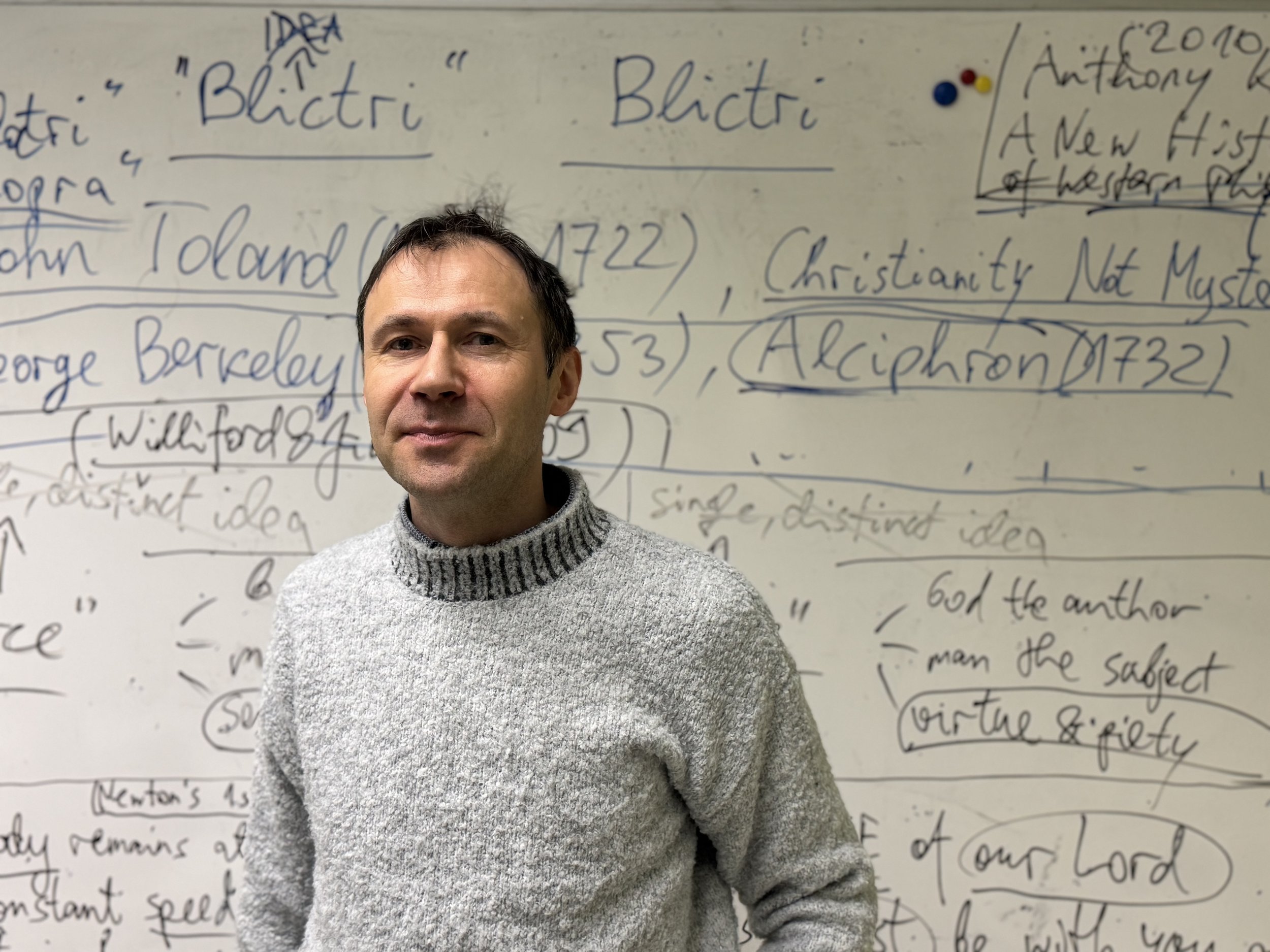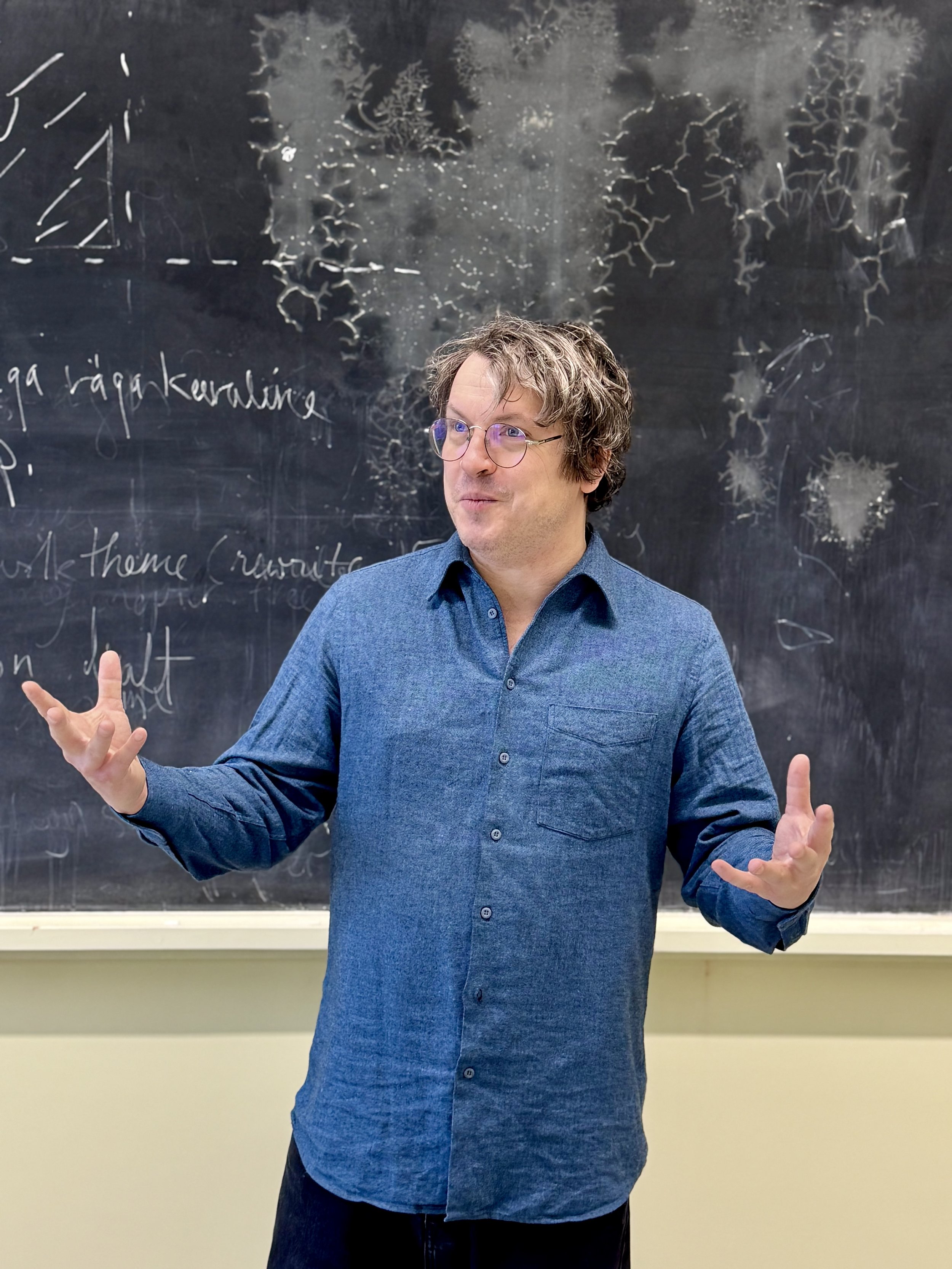A post by Uku Tooming, Roomet Jakapi, Riin Sirkel, and Toomas Lott
We recently received a grant from the Estonian Research Council for a five-year research project titled “Imagination in Cognition: Contemporary and Ancient Perspectives.” Our team consists of four members: Uku Tooming and Roomet Jakapi specialize in contemporary approaches to imagination and related phenomena, while Riin Sirkel and Toomas Lott are experts in Ancient Greek philosophy, Uku Tooming is the primary investigator of the project.
In this blog post, we will provide a brief overview of our main research questions and the way in which we plan to approach them.
Uku Tooming is an Associate Professor at Tartu University. His primary research interests are in philosophy of mind, aesthetics, and epistemology. He enjoys bad movies and even worse music.
Our project has two main aims.
First, we aim to give a comprehensive account of the ways in which imagination provides knowledge, generates understanding, and guides the course of inquiry, etc. - an array of functions we refer to as its ‘cognitive roles.’ In contemporary philosophy of mind, epistemology, and philosophy of science, these roles of imagination have been receiving increasing attention. We believe that engaging with Ancient Greek views is of considerable help in advancing this trend even further. The dialogue between ancient and contemporary philosophy has proven to be fruitful in analytic epistemology, ethics, and metaphysics, sparking interest in the concepts of understanding, ethical virtue, and metaphysical grounding, respectively. We hope that the examination of Ancient Greek views on imagination will have a similar effect on contemporary philosophy of mind and epistemology. Ancient philosophers recognized a wide variety of cognitive roles that imagination can play, while being sensitive to challenges involved in relying on imagination. Second, we hope to show that the conceptual distinctions made by contemporary philosophers regarding different kinds of imagination and their cognitive roles can enrich interpretations of the views and arguments of Ancient Greek thinkers spanning the millennium from Plato to Philoponus (fl. 6th century CE). As far as we know, no systematic study has yet explored ancient conceptions of the cognitive roles of imagination through the lens of recent contemporary distinctions.
Riin Sirkel is an Associate Professor at Tartu University and the University of Vermont. She specializes in the philosophy of Aristotle and his ancient commentators. Currently, however, she likes the Stoics best.
While our methodology draws from empirically informed philosophy of mind to develop our conception of imagination and its roles, in our dialogue with history of philosophy, we proceed from the assumption that Ancient Greek philosophers offer a wealth of conceptual and theoretical distinctions capable of challenging the assumptions underlying contemporary views. We remain open to the possibility that, at least in certain contexts, the insights and frameworks provided by Ancient thinkers can prove to be more fruitful and illuminating than those proposed by contemporary philosophers. It is plausible that Ancient philosophers delineated the conceptual landscape of imagination in ways that differ, whether subtly or significantly, from contemporary conceptions. Likewise, their interest in imagination may have been driven by motivations that diverge, to varying degrees, from our own. The central premise of this project is that recognizing and analyzing these differences can significantly enhance our understanding of Ancient philosophy and advance contemporary debates.
Roomet Jakapi is an Associate Professor of History of Philosophy at Tartu University. His research areas are philosophy of imagination, early modern philosophy, and the philosophy of religion. He is also an internationally performing vocalist and improv musician.
Our project is divided into three parts.
The first part concerns the distinctions between different kinds of imagination, particularly the distinction between perceptual (or sensory) imagination and cognitive (or propositional) imagination. Our primary interest lies in intermediary forms of imagination, which are difficult to classify as strictly perceptual or strictly cognitive. For example, we will scrutinize cases like imaginings of higher-level properties, supernatural entities and mathematical objects, where imagination seems to mediate between perception and cognition by transforming mental representations through abstraction and idealization. The intermediary forms of imagination are abundant in Ancient discussions. For example, the Ancient Greek notion of phantasia, while in many respects similar to perceptual imagination, assumes roles in some philosophers’ (e.g. Plotinus’ and Proclus’) accounts that make it difficult to classify as merely perceptual.
Toomas Lott is a researcher at Uppsala University and affiliated with Tartu University. He specializes in ancient epistemology. He is addicted to blitz chess.
The second part of the project, which serves as its centerpiece, will examine the wide range of cognitive roles that imagination plays in inquiry. Beyond its putative role in justifying beliefs and contributing to the attainment of knowledge—a standard focus in contemporary discussions—we will explore its role in the preliminary stages of inquiry, such as in generating questions and hypotheses, as well as in attaining understanding. In considering the constraints on imagination’s role in the preliminary stages of inquiry, we intend to articulate it as a transitional attitude which is functioning differently from attitudes that are formed in conclusion of inquiry. Moreover, imagination’s role in contributing to the attainment of understanding, beyond its role in the attainment of knowledge, is underexplored in contemporary literature, though it was well-acknowledged by Ancient Greek philosophers. They ascribe to imagination a cognitive role at various stages of inquiry, such as in the preliminary stages (esp. Plato), in justification of beliefs (esp. Stoics and Skeptics), in gaining scientific understanding (esp. Aristotle), in geometrical inquiry (e.g. Proclus) and in craft-knowledge (e.g. Philoponus), as well as in education (esp. Plato).
The third part of the project addresses the challenges to the cognitive roles of imagination due to its inherent biases and blindspots. We take inspiration from recent contemporary accounts of imagination as a skill and hypothesize that these biases can be managed by cultivating imaginative skills. Furthermore, we explore the possibility that imaginative skills are constitutive of some epistemic virtues such as open-mindedness and intellectual courage. This could have interesting applications for epistemology of education and pedagogical practices, given that cultivating epistemic virtues is often considered to be one of the goals of education. The role of imagination in education was discussed by the Ancient philosophers, whose views can be highly informative for contemporary thought by offering a complex and sophisticated discussion of techne (“skill”) that could help conceptualize the role of imagination as a skill. Relatedly, the Ancient philosophers’ views on perceptual illusions and wishful thinking can deepen our understanding of dangers and limits of imagination.
We plan to organize a series of international conferences and workshops at Tartu University, Estonia. Some of the planned events will focus on specialized topics within the study of imagination. For example, we will host events that explore how supernatural entities are imagined. By zooming in on specific uses of imagination, we aim to gain insights into how the structure of imagination is shaped by cultural, historical, and cognitive contexts. We also plan at least two large international conferences that address the overarching themes of the project. These conferences will bring together contemporary philosophers and scholars of Ancient philosophy to explore how the cognitive roles of imagination have been understood across time. They will provide opportunities to synthesize and generalize the diverse ways imagination has been conceived across different philosophical traditions. In addition, we dedicate our efforts to clarifying the methodology for studying imagination. Given that our project seeks to bridge historical and contemporary philosophy, it is essential to develop a clear and rigorous methodology for cross-historical research. To this end, we plan to bring together philosophers with expertise in cross-historical dialogue and invite them to participate in workshops focused on the methods used to study imagination in both historical and contemporary contexts.
We would like to invite philosophers and scholars of Ancient philosophy whose research explores imagination and related issues to reach out to us (uku.tooming@ut.ee). As a small group with inevitable limitations in the scope of our expertise, we would appreciate feedback from peers in various subfields of philosophy. We especially encourage prospective PhD students and postdoctoral researchers to contact us for supervision or collaboration opportunities.





